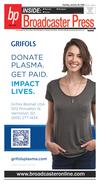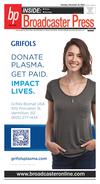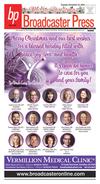5.pdf








Broadcaster Press 05
March 5, 2013 www.broadcasteronline.com
Messersmith’s work focuses on effective use of chochlear implants
Spotlight
On
By Travis Gulbrandson
travis.gulbrandson@plaintalk.net
In 1985, the FDA
granted approval to
cochlear implants, which
are devices that provide
sound to people who are
deaf or hard of hearing.
Since that time,
advances in technology
have been made, but
more is still being
learned.
Dr. Jessica
Messersmith, Ph.D., an
assistant professor of
Communication Sciences
& Disorders at USD,
currently is taking part in
several studies that aim to
help those with cochlear
implants – especially
children – use them as
effectively as possible.
“We’re not going to
make life perfect for
them, but we really
should be able to make
life better for them,”
Messersmith said.
The studies
Messersmith is
performing with other
doctors and graduate
students take a look at
how children with
normal hearing and
cochlear implants use
sound.
“We’re interested in
what parts of a sound
they pay closest attention
to, and how that might be
related to their early
literacy skills,” she said.
One way to do that for
children with cochlear
implants is to play a word
for them, and then adjust
the implant based on the
results.
“We’re always
interested in speech, and
what they use when
listening to words,”
Messersmith said. “We
play them words, and we
play them in different
types of noise. I can vary
the noise, and how much
noise there is in different
pitch ranges, and look at
how that impacts the
word they say they
heard.”
Adjustments also can
be made relating to pitch,
she said.
A cochlear implant
works based on
electricity, and is similar
to a hearing aid in that
there is an outside
component that a person
can wear on their ear.
“A hearing aid takes
sound and amplifies it …
and then sends it through
the auditory system. A
cochlear implant works
differently in that the
outside part picks up the
sound and changes it into
electrical impulses,”
Messersmith said. “Those
electrical impulses are fed
to the hearing nerve
directly through a
surgically-implanted
device.”
While a person with a
cochlear implant will
never have “normal”
hearing, Messersmith said
this should really never
be the goal.
“We’re giving them
electrical sound,” she
said. “For people with a
cochlear implant, sound
is different to them, and
unfortunately, we really
can’t say what sound
‘sounds like’ to them,
because it’s different for
each person. Whenever
the brain is involved, it’s
always different from
person to person. …
“A reasonable goal for
most people with a
cochlear implant would
be to have a conversation
with three or four people
in quiet,” she said.
For people with
cochlear implants, this
goal probably could not
be met with regular
hearing aids.
“There would still be
situations that would be
difficult,” Messersmith
said. “Anything dealing
with a large room,
auditoriums, churches,
things like that, are still
going to be difficult. The
telephone for most
individuals with a
cochlear implant is going
to be difficult, and that’s
just because they have to
rely solely on their
hearing, rather than
having some of the visual
cues.”
Messersmith had been
a cochlear implant
audiologist since 2004,
and has been involved in
this type of research since
2007. She has been at
USD since August of
2009.
“One of my goals
when coming to USD was
starting a cochlear
implant clinic. I was able
to start seeing patients in
November of 2010,” she
said. “Since that time our
clinic has just expanded,
and really exploded in
terms of the number of
patients.
“We do not have a
surgeon, but I have
several surgeons that I
work with, and so we are
a full-service cochlear
implant clinic,” she said.
The clinic serves about
30 patients overall, some
of them coming from
Sioux Falls and Omaha.
Advances in cochlear
implant technology
continue to be made, to
the point now where they
can be connected directly
with MP3 devices.
“We have a lot to learn
about them,” Messersmith
said. “Since about 2004,
2005, the processing that
goes on in the cochlear
implant has gotten
extremely good just as
processing in our home
computers has gotten
better.
“As those changes
happen, we need to make
sure that in the clinic
we’re staying on top of it,
and using the most
efficient practices to
make sure they’re hearing
the best that they can,”
she said.
Please Recycle!
Call Emily to schedule a complimentary
consultation today.
W
Call
624-4429
• WANTED •
Old Vehicles • Farm Machinery • Scrap Iron
PAYING TOP DOLLAR
Call
402- 841-1060
For Price
3 Lots Left
Approx. 1 acre lots
2 miles East of
(176’x227’)
Casey’s on 8th &
Oil Road • BY Water
Burleigh, then 1/2
Beautiful view
mile north.
of Jim River Valley
Country View Acres 661-0120 • 665-3193 • 661-1249
ridal Directory
B
Let us help m ake your day
everythin g you’ve dream ed of.
Classifieds
work!
enduring beauty
From first glance to the last
dance, we’ll create a wedding
day look that will continue to
take your guests breath away...
illson Florist
21 W. Main St., Vermillion
605.624.4491
Special Occasions and
Wedding Rentals, Invitations,
Set-Ups & Take Downs
The Looking Glass
902 Eastgate Drive
CALL FOR AN APPOINTMENT
605-624-4587 or 605-660-1931
visit the web at: wedo-weddings.info
“Bringing you the best in
bridal & prom for less!”
The
Bridal
Outlet
1108 W. Cedar St., Beresford, SD
1-855-444-BRIDE
Hours: M-Th 10-6, Fri. & Sat. 10-5









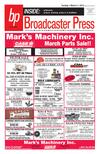
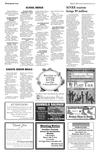
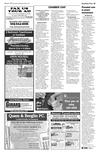
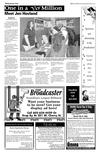
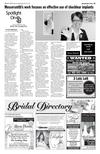
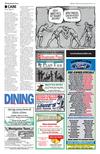
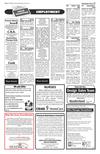
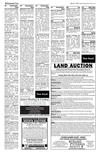
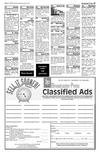
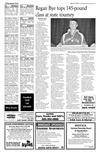
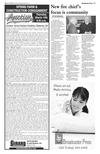
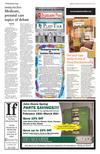
 Previous Page
Previous Page



